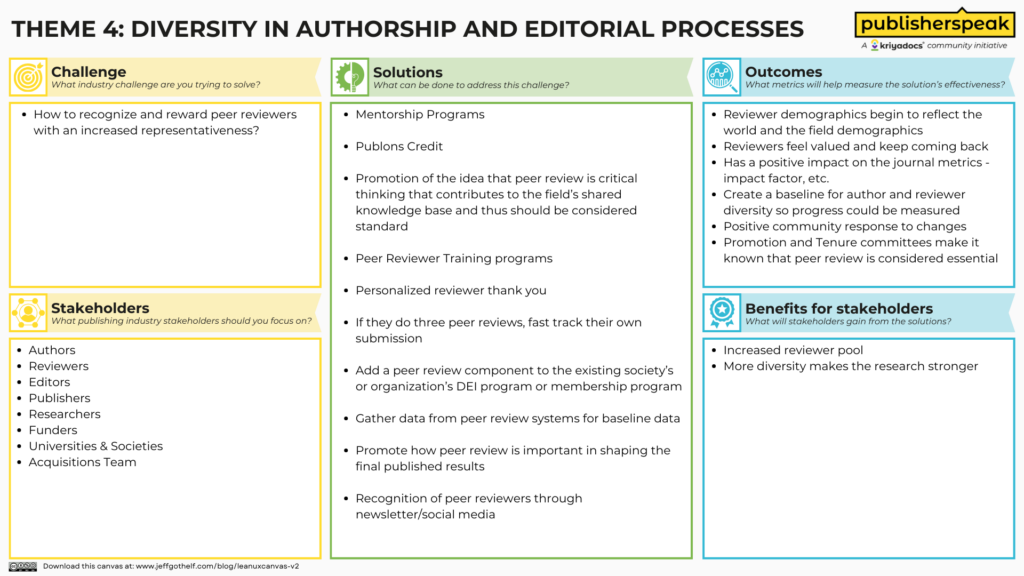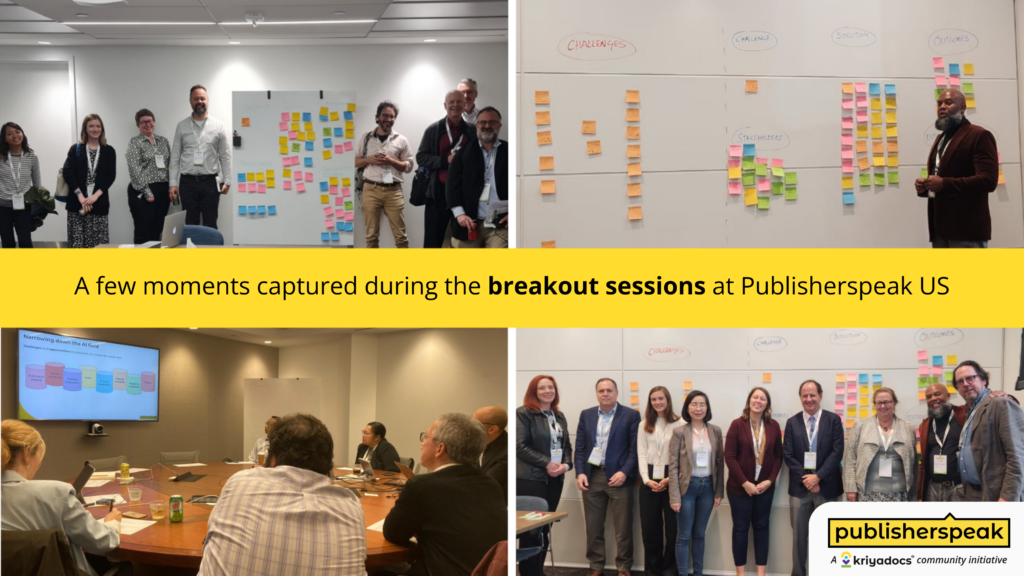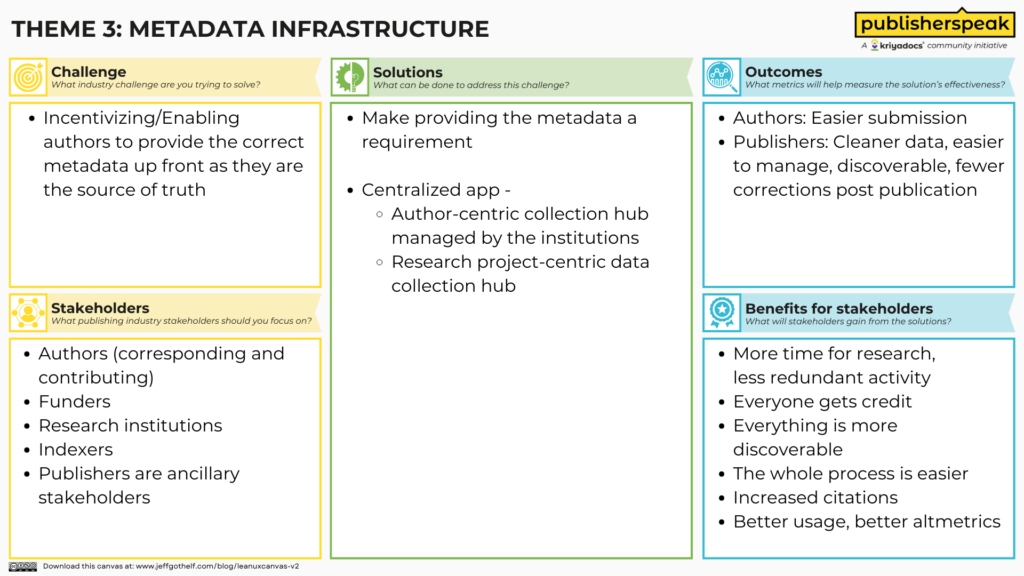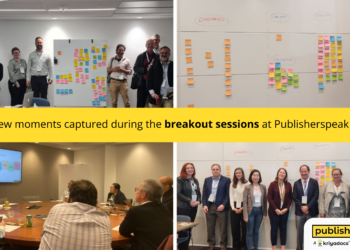Editor’s Note: Today’s post is by Ravi Venkataramani, Sowmya Mahadevan, Abhaya Ranganathan, Jason De Boer, Louise Russell, Patricia Kershaw, Richard di Santo, David Haber, and Randy Townsend.
Publisherspeak US is an in-person, unconference-style community event sponsored by Kriyadocs. The goal of this conclave is to provide a platform for stakeholders to collaborate, generate innovative ideas, and acquire actionable insights to overcome the challenges faced in scholarly publishing.
The first edition of the conclave took place on September 26, 2023, at the AGU Conference Center in Washington, DC. The next editions of the conclave are coming to the UK in May 2024 and the US in September 2024. Interested individuals can register for Publisherspeak UK 2024 here and Publisherspeak US 2024 here. Yesterday’s post looked at the first two breakout sessions from the meeting, and today’s the second pair.
Breakout sessions at Publisherspeak US
The unconference-style breakout sessions at Publisherspeak US 2023 were designed to help delegates ideate and craft actionable solutions for the challenges facing publishing today. The audience was divided into four groups, and each group — led by a key stakeholder in the industry — tackled a specific and critical theme within scholarly communication.
During each session, the following steps were taken:
- Each group actively participated in a collective brainstorming session to identify the three most significant challenges associated with their designated themes.
- Following this initial brainstorming session, each group engaged in voting to select one specific challenge to delve deeper into during the latter part of the session.
- To address the selected challenge, the teams conducted a detailed analysis and engaged in a thorough brainstorming process.
- This effort culminated in the group creating a Solution Canvas, outlining potential strategies and solutions for addressing the identified challenge.
The Solution Canvas
The Solution Canvas is a framework inspired by the Lean UX Canvas that aims to guide participants of the breakout session in brainstorming about the challenges in scholarly publishing from a holistic perspective.
The five key components of the canvas are briefly described below:
- In the Challenge segment, participants put down the challenge they selected as a group in the previous step.
- The Stakeholders segment encourages participants to list out all the stakeholders that are related to the challenge at hand, fostering a collaborative mindset.
- Solutions encourage the generation of diverse ideas and strategies to tackle the challenge.
- Outcomes facilitate the envisioning of the desired results and impacts of proposed solutions.
- The Stakeholder Outcomes & Benefits section encourages participants to analyze the positive effects and advantages that their proposed solutions may bring to stakeholders.
The Solution Canvas empowers participants to address challenges comprehensively and systematically. With this structured framework, participants can take a well-rounded approach to problem-solving, ensuring that stakeholders remain a central focus throughout this exercise.
Breakout Session Themes
The breakout sessions at Publisherspeak US centered around themes that hold relevance within the scholarly publishing landscape. These topics were curated collaboratively by the breakout session chairs to align with the concerns and interests of stakeholders in scholarly publishing.
Theme 3: Metadata Infrastructure
This theme focused on the critical underpinning of academic publishing — metadata. Attendees explored the significance of well-structured metadata and opportunities for industry-wide improvements, and the session was chaired by David Haber.
The significance of metadata
Metadata, defined as “data about data,” plays a crucial role in scholarly research by helping to describe resources in a structured manner. In the context of journal articles, metadata encompasses unique, persistent identifiers (PIDs), such as the International Standard Serial Number (ISSN), the Digital Object Identifier (DOI), and the Open Researcher and Contributor ID (ORCID), as well as journal information such as volume, issue, and page numbers. Similarly, book metadata encompasses elements such as the International Standard Book Number (ISBN), title, page numbers, and author information.
When metadata is standardized and machine-readable, it presents numerous, significant benefits. It helps acknowledge research funders appropriately, facilitates searchability and discoverability of the content, enables reproducibility, and more. In essence, metadata serves as the linchpin in the seamless exchange, discovery, and recognition of scholarly contributions.
However, the potential of metadata to yield a positive impact hinges on its accuracy, consistency, and robustness. Currently, the scholarly publishing industry grapples with challenges stemming from a lack of synchronization across publication phases, leading to the loss of crucial metadata. Additionally, the management of metadata requires a substantial amount of manual effort. This deficiency has far-reaching consequences, negatively impacting discoverability and interoperability with other systems.
The case for rich metadata is evident. However, integrating it seamlessly into existing processes in the scholarly publishing landscape remains a significant challenge.
Challenge identified
The group handling this theme identified core challenges pertaining to metadata infrastructure, and “Incentivizing/Enabling authors to provide the correct metadata up front as they are the source of truth” was selected as the top challenge to focus on, and the group built their Solution Canvas to address this challenge.
Strategic solutions to enable and ensure accurate metadata
Ensuring accurate and comprehensive metadata from the outset is paramount, as authors serve as the primary source of truth in scholarly research. Recognizing this, the group at Publisherspeak US collaboratively brainstormed strategies to enable the collection of precise metadata directly from authors.
The group put forth a strategy that involves mandating authors to provide metadata, supported by a centralized app featuring an author-centric metadata collection hub managed by institutions. Additionally, the group suggested a research project-centric data collection hub, aiming to streamline and simplify the author submission process.
These strategies not only enhance the submission experience for authors but also benefit publishers by ensuring clean, easily manageable data. The result is more discoverable content driven by accurate metadata, ultimately leading to fewer post-publication corrections.
It was recognized that this is a twofold challenge:
- The technical problem of centralized metadata capture
- The behavioral change required if metadata capture and maintenance became a point of emphasis in the research lifecycle
Of the two challenges, it is the second that is the most difficult. Despite our new world of interoperability and digital transformation, the black box of print workflows still dominates and informs so many of our systems. Because of that, any new process or technical solution is engineered around these frequently outdated assumptions about what is being produced and distributed as research outputs. It must be remembered that one of the most vital outputs of research (in addition to the discovery itself) is clear, precise information about said discovery. It is not necessarily a research article in the form of a pretty PDF file or elaborate webpage. Those are just by-products.
With the article being just a single planet circling the solar system of a given research endeavor, it is vital that the metadata about science becomes central and top of mind for the researcher. Our workflows and processes need to emphasize that point in each step, making it easy and simple for authors to confirm, change, and update those key girders that connect their science to the world.
A challenge of this nature calls for collaboration from various stakeholders, including corresponding and contributing authors, funders, research institutions, indexers, and publishers as ancillary stakeholders. A holistic approach to this challenge, as outlined by the Solution Canvas, can help bridge the gap between the potential benefits of rich metadata and the current challenges faced in its implementation within the scholarly publishing ecosystem.
Theme 4: Diversity in Authorship and Editorial Processes
Exploring ways to promote inclusivity in scholarly publishing, the focus of this theme involved examining the role of diverse authorship and editorial practices in enhancing academic content and perspectives, and was chaired by SSP President Randy Townsend.
The significance of research extends far beyond academic realms, permeating into the very fabric of societal progress and understanding. As our world becomes increasingly interconnected in the digital age, the importance of research lies not only in advancing knowledge within specific fields but also in ensuring that diverse voices are heard.
In scholarly communication, peer review stands as a cornerstone of academic rigor, ensuring the novelty and quality of research disseminated to the world. For over three centuries, this method of evaluation, where subject matter experts critically assess research, has played a critical role in shaping scientific discourse.
While peer review is undoubtedly a long-established and essential ritual in the scholarly publishing process, it is not without its imperfections. The traditional peer review process is affected by systemic issues such as racism, bias, and inequality. Furthermore, a lack of recognition for review work and reviewer fatigue, stemming from reviewers receiving excessive invitations to evaluate manuscripts, are also significant issues impacting scholarly communication today.
Considering the very nature and purpose of research and peer review, recognizing the imperative for equity, diversity, and inclusion (EDI) in publication processes is crucial. Equity involves addressing identity-based advantages and barriers, diversity aims to increase the presence of individuals with diverse identities, and inclusion fosters an environment where all are welcomed and valued. A more diverse peer review process can enhance quality and fairness by encouraging debate and discussion from a varied range of voices.
It is a collective responsibility to ensure that the research landscape is inclusive, reflective of varied perspectives, and capable of advancing research in a fair and unbiased manner.
Challenge identified
The group handling this theme identified core challenges pertaining to diversity in authorship and editorial processes, and “How to recognize and reward peer reviewers with an increased representativeness?” was selected as the top challenge to focus on, and the group built their Solution Canvas to address this challenge.
Strategic solutions to recognize and reward peer reviewers
It is imperative to recognize and reward peer reviewers for their significant contributions to the advancement of research. By extending gratitude and tangible acknowledgment, we celebrate individual efforts and cultivate a collective ethos that values the dedication and expertise that peer reviewers bring to the forefront of progress.
The group brainstormed on strategies to better recognize and reward peer reviewers. The group’s Solution Canvas also highlights the benefits for the stakeholders impacted by this challenge: an increased reviewer pool and more robust research as a result of greater diversity.

The Solution Canvas emphasizes the promotion of peer review as a vital exercise in critical thinking, contributing to the shared knowledge base within the field. Additionally, the group acknowledged the significance of collecting data from peer review systems to establish baseline data. Establishing a baseline for author and reviewer diversity lays the foundation for ongoing progress and allows for measurable growth.
To enhance peer review and empower reviewers for optimal contributions, the group proposed strategies centered around mentorship and training programs. The group also put forth solutions to reward and incentivize peer reviewers, such as personalized acknowledgments, expedited processing for researchers with a minimum of three reviews, Web of Science Researcher Profiles (formerly Publons) credit, and more.
The solutions outlined by the group can result in tangible improvements in journal metrics as well as a positive response from the community. Fostering author and reviewer diversity not only aligns with ethical considerations but also contributes significantly to the overall enhancement of scholarly endeavors.




